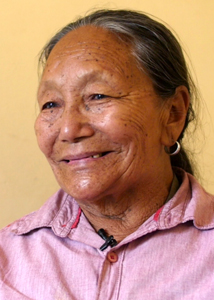Name: Pasang
(Alias: No)
Gender: Female
Interview Age: 73
Date of Birth: 1944
Birthplace: Geji Zakarnag, Kham, Tibet
Year Left Tibet: 1960
Profession: Nomad
Monk/Nun: No
Political Prisoner: No

Interview No.: 24U
Date: 2017-03-30
Language: Tibetan
Location: Rajpur, Uttarakhand, India
Categories: Culture and History, Oppression and Imprisonment
Keywords: Chinese -- first appearance of, clothing/weaving, customs/traditions, environment/wildlife, escape experiences, food/drink, forced labor, Kham, nomadic life, refugee in Nepal -- life as
Summary:
Pasang was born in Geji Zakarnag in Kham to a nomadic family that raised yaks, dri 'female yaks,' sheep and goats. As a young girl she assisted her mother with milking the dri and making butter, cheese and curd. Meat and dairy products were the main part of their diet. They exchanged their dairy products, meat and wool for grains in Jekundo and Nagchuka.
Pasang's family lived in a tent and relocated whenever they needed to find greener pastures. The only fuel available in her region was dung. Pasang describes in detail how dung was flattened, dried and stored in covered heaps to be used when it rained in summertime. Water was easily accessible during the summer, but during winter ice had to be melted. Pasang describes the nomads' cookware, tea, clothing, jewels and medicine.
The Chinese appeared when Pasang was 8 years old and she was unable to become a nun as she had hoped to. Her family spent many months on their escape journey until being caught at Thoe Bawa. Her father and brother were taken away to China and Pasang, her mother and her sister were forced to tend sheep for the Chinese. After seven months, they escaped again but Pasang's mother died on the journey. Pasang and her sister continued on to reach a settlement in Nepal.
Interview Team:
- Marcella Adamski (Interviewer)
- Tenzin Yangchen (Interpreter)
- Tenzin Choenyi (Videographer)

